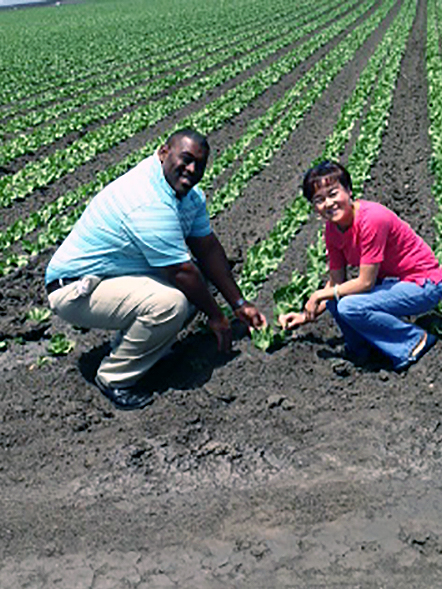Recently, Booker Carpenter, a Food Scientist here at Pizza Hut, and others from the Food Safety and Quality Assurance team flew to Salinas, California for a three-day meeting of the minds among produce suppliers, growers, regulatory groups, third party consultants, and others from the restaurant industry. Topics ranged from improvements to pre-harvest procedures, pathogen eradication, and other highly technical produce industry topics: the nitty-gritty of what goes into growing the best ingredients for our pizzas, from tomatoes to green peppers. Booker caught up with Hut Life to walk us through some of the important things our company is doing to make sure our pizza is full of the good stuff.
Quality assurance is a field that may seem relatively straightforward, but is anything but. Just make sure your tomatoes are red and your peppers are spicy, right? It’s actually a good deal more complicated than that—and with the passing of the Food Safety Modernization Act (FSMA) in 2011, the new government mandate requires suppliers and producers to focus on preventing food contamination, rather than simply responding to it. Booker walked us through how this Act has changed the way we work with suppliers, as well as some of the more technical aspects of the conference that seem complex, but can have a huge effect on the customer experience. Here are three things we learned from Booker:
- Food Safety > Competition.
Clearly, competition within the fast casual industry can be fierce. But, Booker notes, food safety brings everyone together. No one wants to see customers and fans getting sick from their food. Many times we share relationships with the same suppliers and farms, so attending conferences like these really bring everyone together. “Our suppliers are great partners, and they all work well together. We understand that we’re all competitors, but quality will always come first, and we’re willing to share information across the aisle to make our products better,” says Booker. “For me, personally, it was a highlight of the conference.
Across the board, suppliers and restaurant companies alike are always striving for continuous improvement in all areas of their operations. One tactic that Booker experienced was daily training sessions for field workers. “I joined a crew in the middle of their daily training session—something they do at the start of each and every day. They go through different stretching exercises to make sure they’re safe and ready for the work at hand,” says Booker. “They talk about the different safety topics as well as any other training that might be beneficial for the day’s activities. We are constantly training field crews on things to look for, best practices, and how they should conduct themselves when out in the field—it’s a very detailed operation that our crews are undertaking before they harvest the produce we’re going to consume.” The food industry is tightly knit together from start to finish in the goal of offering quality ingredients to the end customer.
- FSMA Brings us Closer Together
The Food Safety Modernization Act is a big deal for suppliers and brands alike. It shifts the focus of food safety from response to prevention—and is the first major piece of legislation to affect food safety in 70 years. FSMA aims to ensure that the US food supply is safe by shifting the focus from responding to the contamination of the food supply to preventing said contamination. Pizza Hut has been working closely with our suppliers for a number of years, and if anything, this only strengthens the bond we share with our partners to offer the best possible ingredients to our customers.
Not surprisingly, FSMA was a big topic at the conference. There were lots of conversations to be had around following and understanding the compliance metrics. “We want to make sure that our suppliers are focusing all their efforts on being preventative. For us, we work even more closely with our partners to make sure they are on track to follow all the guidelines signed into law by President Obama,” explains Booker. “We’re holding them accountable just as the president is holding everyone accountable. That means taking a holistic look at food safety to make sure we’re compliant every step of the way.”
- QA and Product Development go hand in hand.
For Booker, this conference was a piece of a much larger puzzle. Quality Assurance is somewhat of a new role for him—and this short-term assignment will serve to strengthen his development. “Quality is of the utmost importance, so I’m constantly working with our restaurant food safety team, suppliers, and others to make sure that our product enables a wonderful customer experience. In this new role, I’m making regular supplier calls and visits, reviewing audits, and monitoring supply and product quality,” says Booker. “I’m able to understand what goes on in Quality Assurance so that when I return to Product Development, I’ll be able to bridge that gap in knowledge. How can we work together better to make sure our new products are the best they can be?”
With all the technical aspects that go into food safety and quality—from field management to water treatment to reducing the risk of pathogens—a lot of time, energy, and effort is put into collaborating and supporting our produce partners to lower the risk of food contamination. As the largest pizza company in the world, nothing could be more important than food safety at Pizza Hut!

